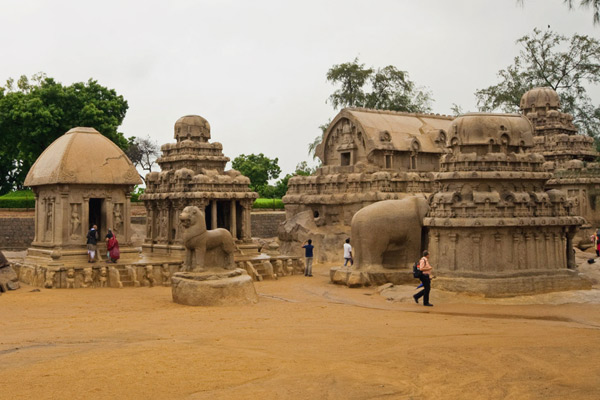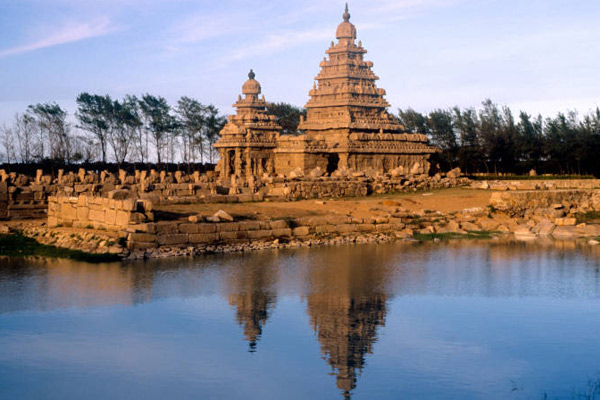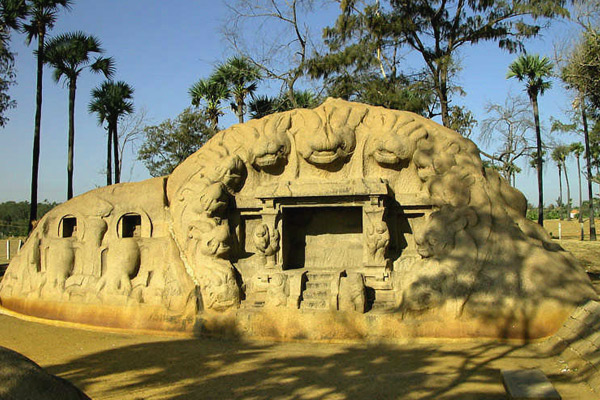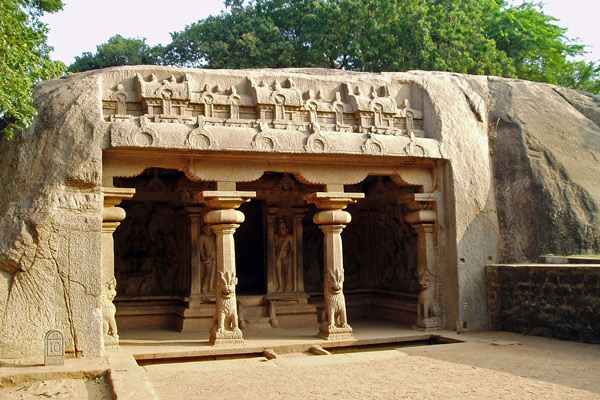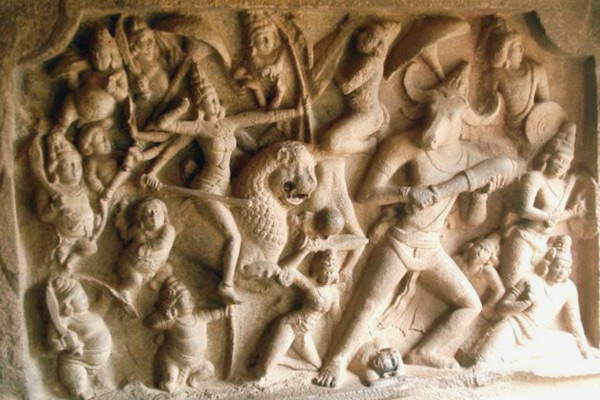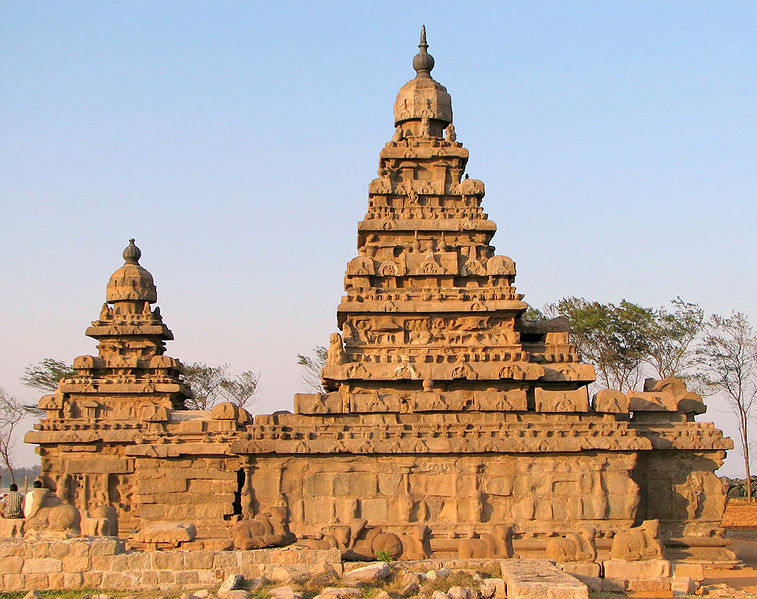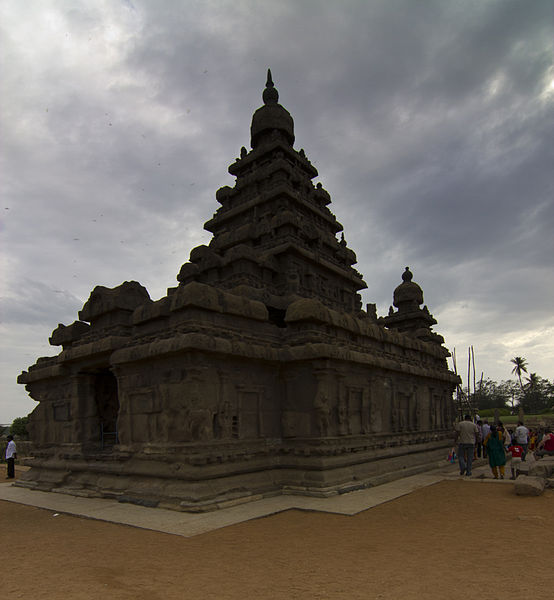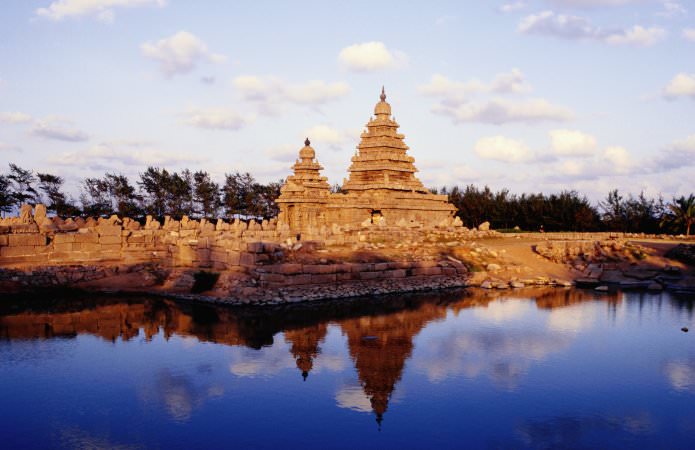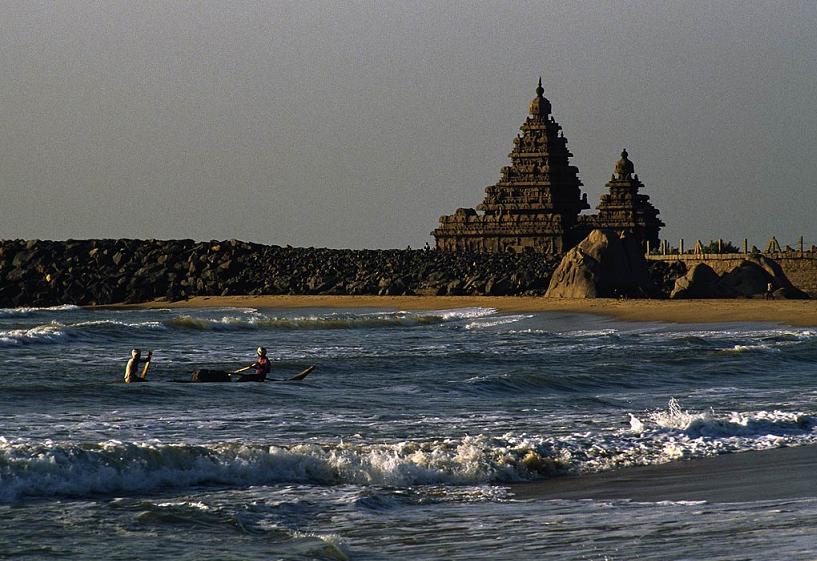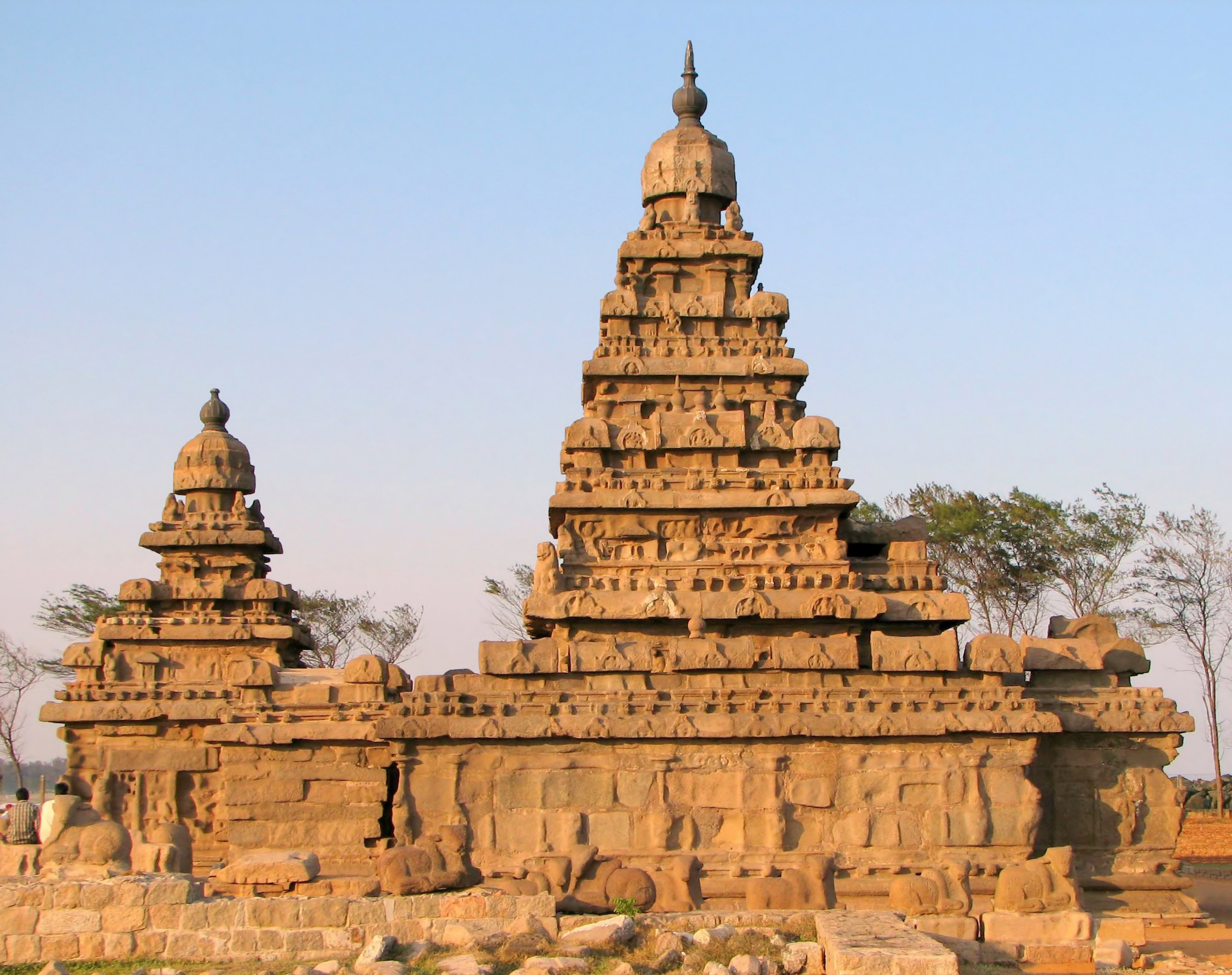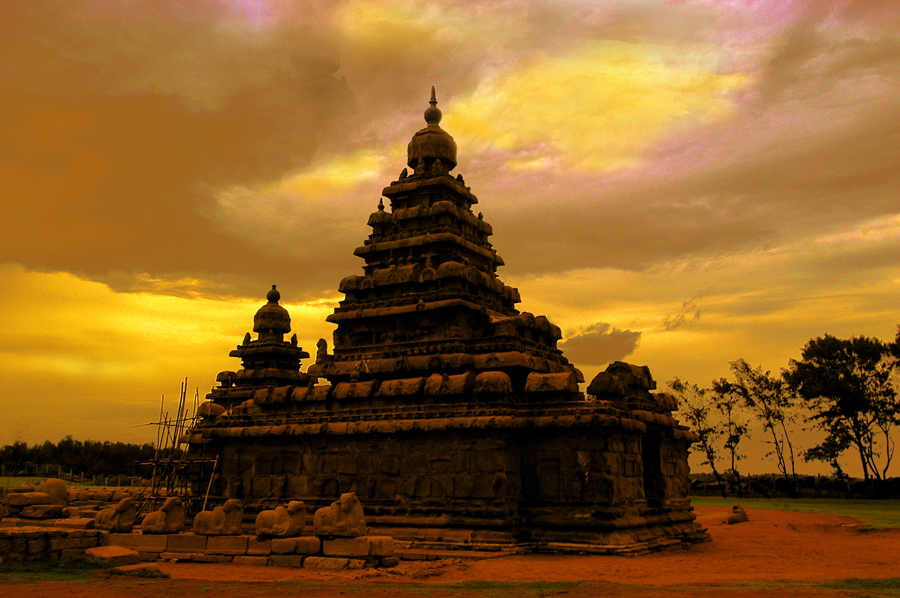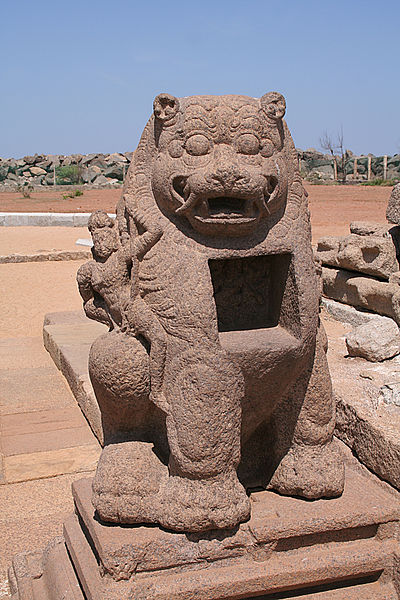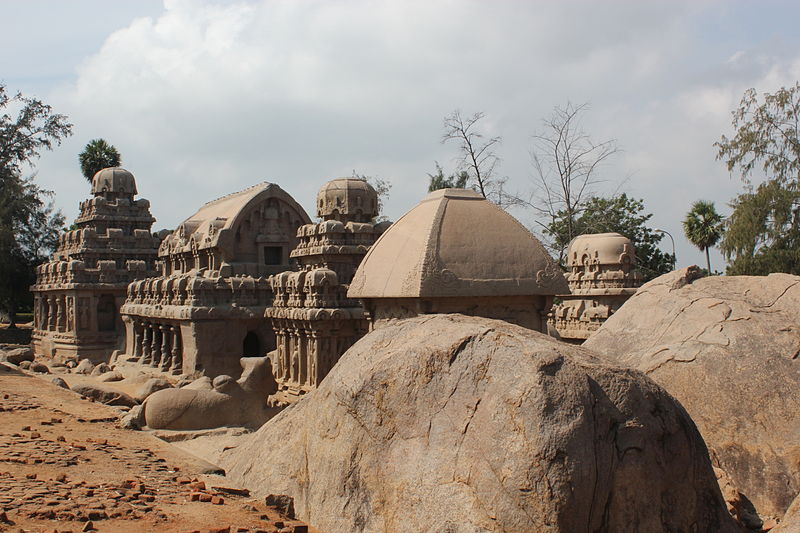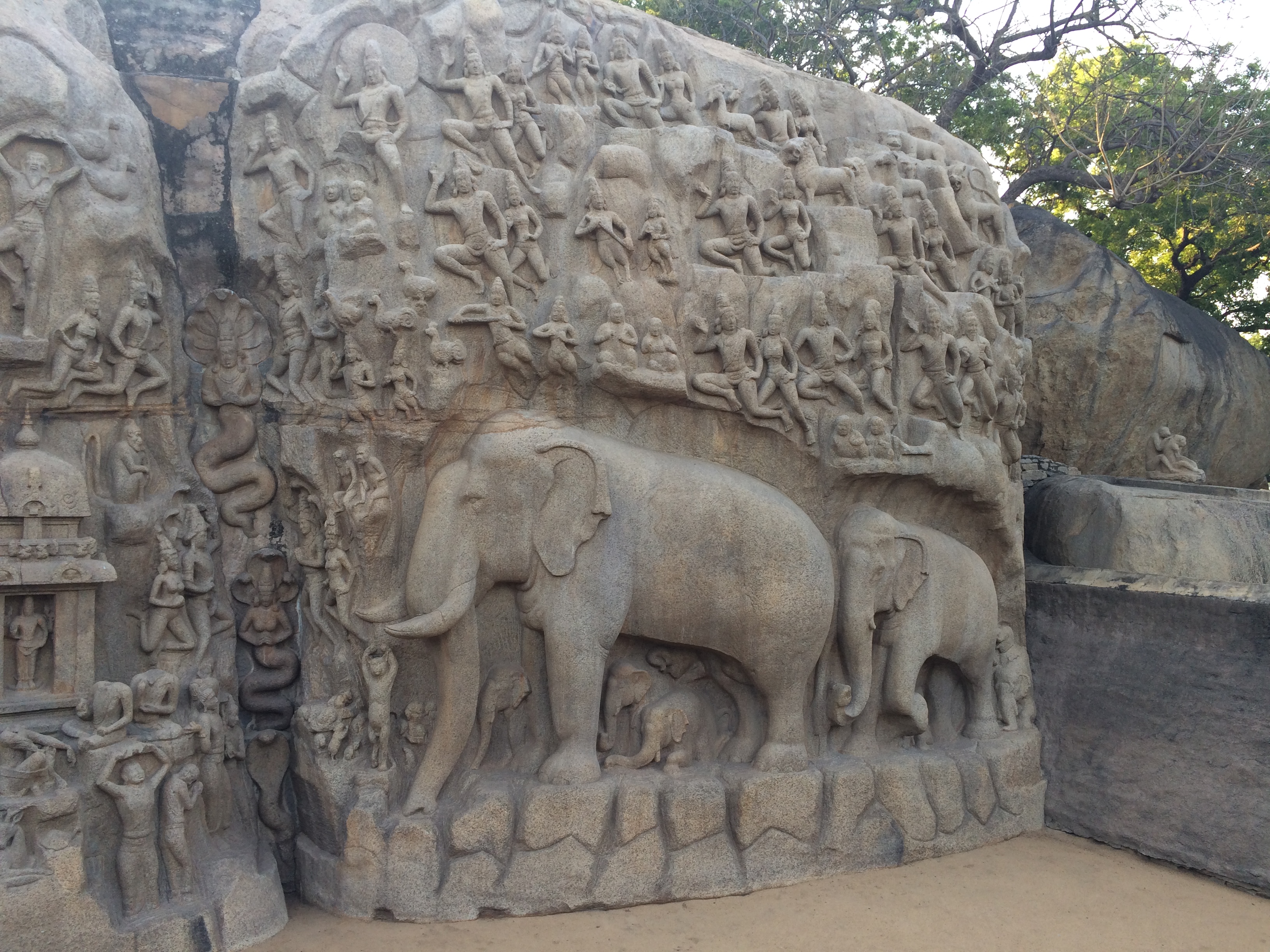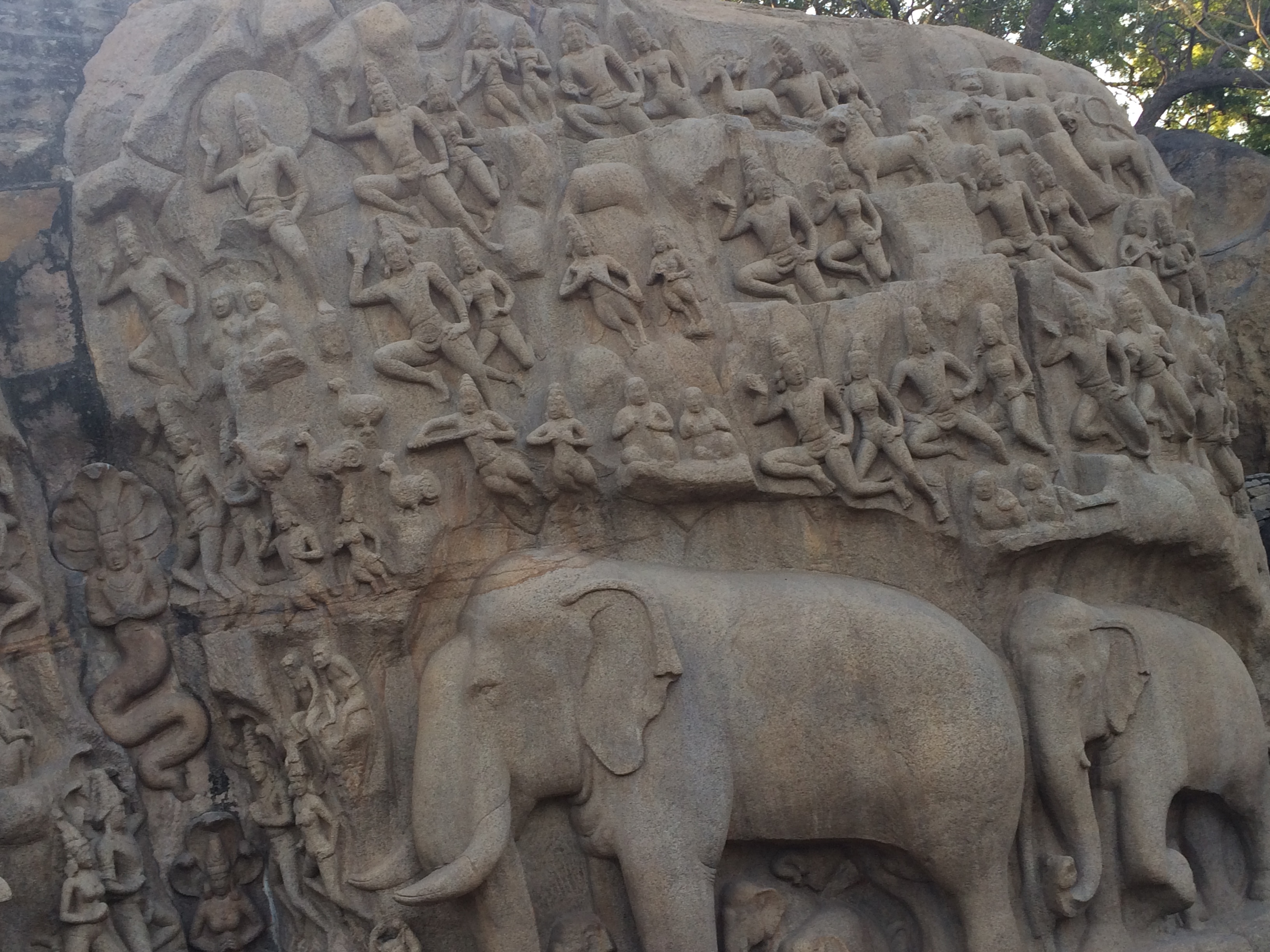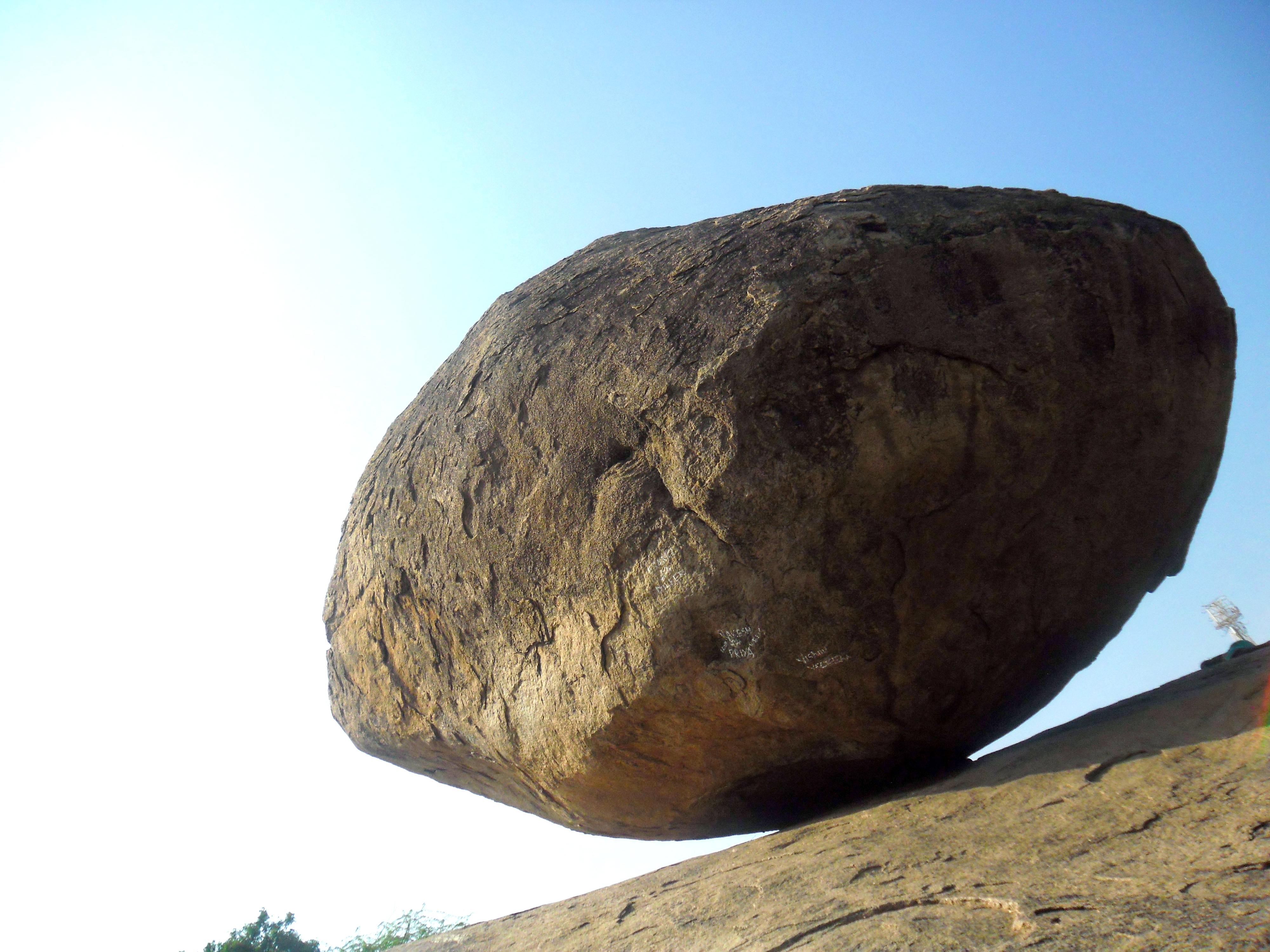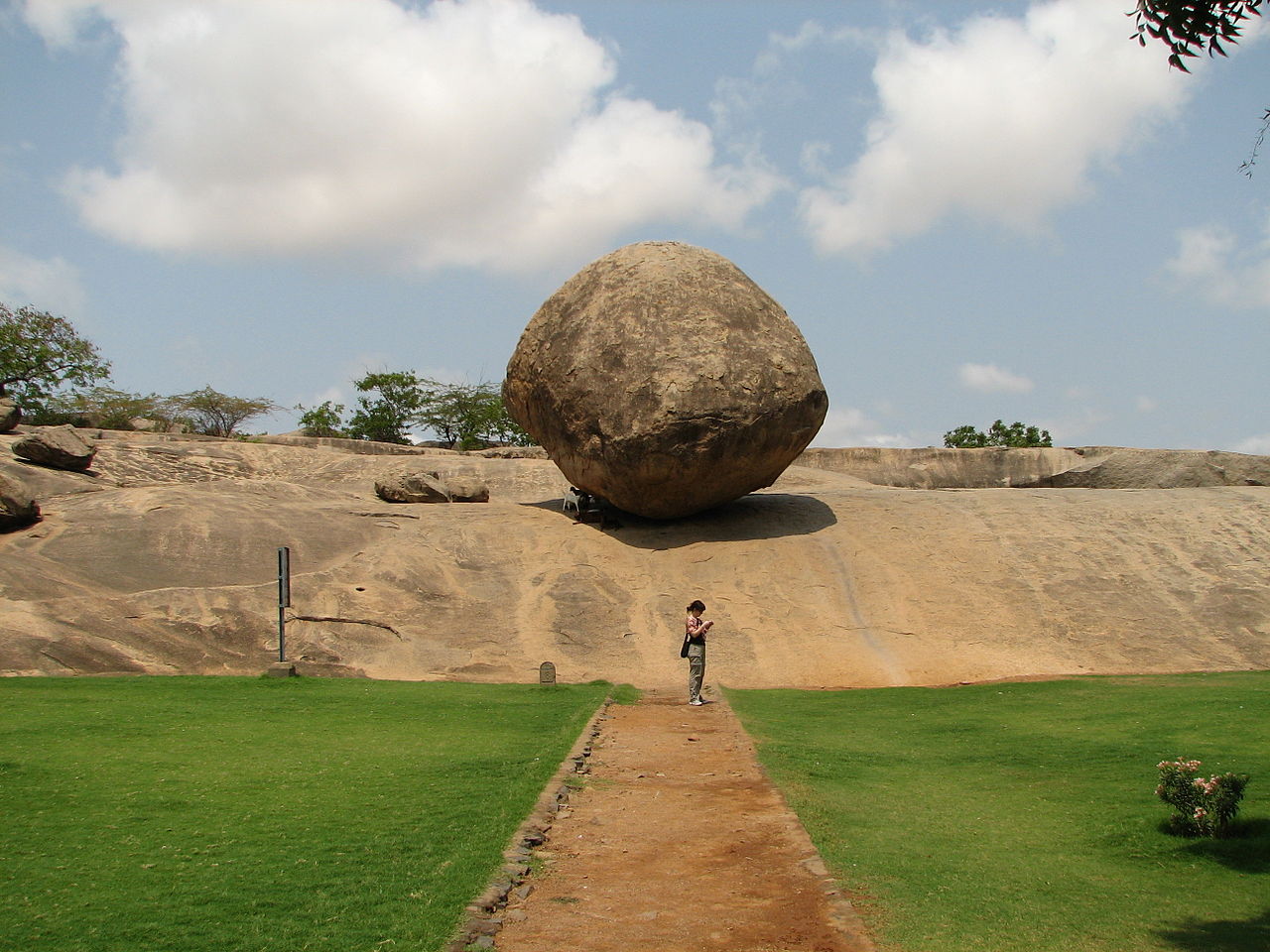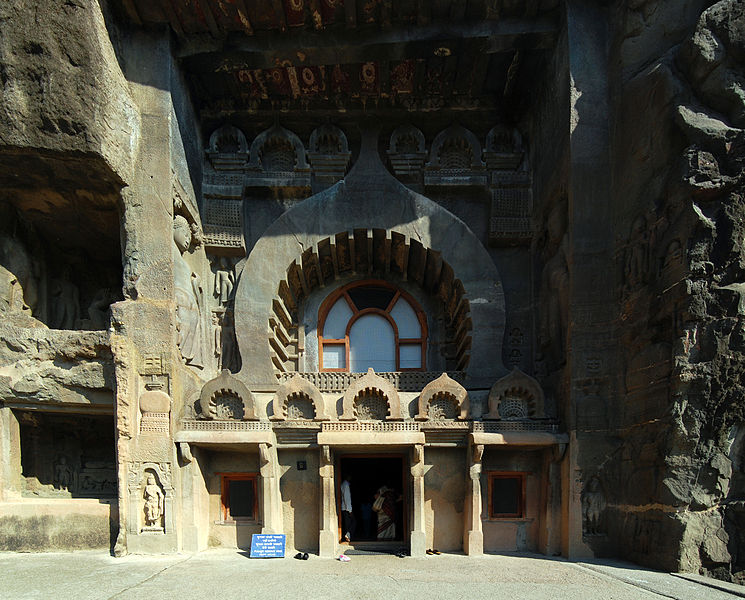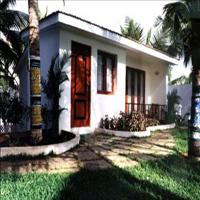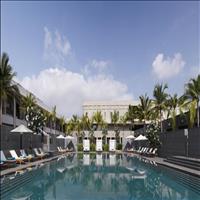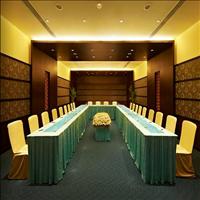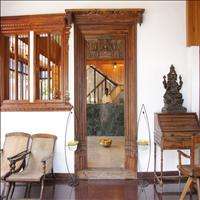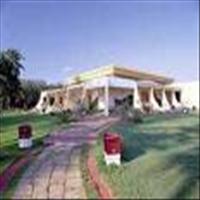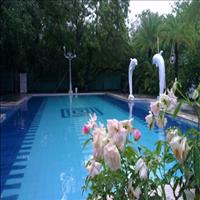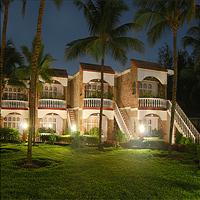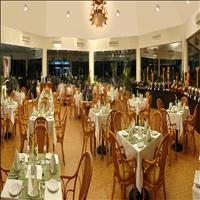Mamallapuram
Temple Town of Tamil Nadu
General Information
Common Name: Mahabalipuram
Other Name: -, District: Kanchipuram, State: Tamil Nadu, India
Area: 8 Sq. Km.
Languages Spoken: Tamil and English
Long Distance Code: +91-4113
Importance: Famous for the beach temple
Best Time to Visit: October to February and Throughout the year for religious purpose.
International Access: -
Description
The history of Mahabalipuram (Mamallapuram) dates back to two thousand years, it contains nearly forty monuments of different types including an "open air bas relief" which is the largest in the world, for centuries it has been a centre of pilgrimage, it figures in the early annals of the British search for the picturesque in India in the 18th century, today it attracts shoals of foreigners in search of relaxation and sea bathing, and most strange of all, it has an atomic power plant for neighbors. A small library has been written on it. Over its history and that of its monuments a number of scholarly controversies rage. Mahabalipuram was already a centre of pilgrimage when, in the 7th century Mamalla made it a seaport and began to make temples fashioned of rock. It was through Mahabalipuram that many Indian colonists, who included sages and artists, migrated to Southeast Asia. Sri Lanka's national chronicle, the "Mahavamsa" testifies to this fact.Location
58-Km from Chennai, Tamil NaduClimate
-
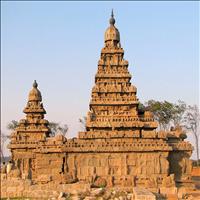 There are two low hills in Mahabalipuram, about 400m from the sea. In the larger one, on both sides, there are eleven excavated temples, called Mandapas, two "open air bas reliefs"; one of which is unfinished, and a third enclosed one. Out of a big rock standing free nearby there is a "cut out" temple, called a "Ratha". This type is unique to Mahabalipuram.\r\nOut of the other hill, much smaller and standing about 200m to the south, are fashioned five more rathas, and three big sculptures of a Nandi, a Loin and an Elephant. On the top of the bigger hill there is a structural temple, and a little distance the magnificent beginnings of a Vijayanagar Gopura and also survivals of what is believed to be a palace.
There are two low hills in Mahabalipuram, about 400m from the sea. In the larger one, on both sides, there are eleven excavated temples, called Mandapas, two "open air bas reliefs"; one of which is unfinished, and a third enclosed one. Out of a big rock standing free nearby there is a "cut out" temple, called a "Ratha". This type is unique to Mahabalipuram.\r\nOut of the other hill, much smaller and standing about 200m to the south, are fashioned five more rathas, and three big sculptures of a Nandi, a Loin and an Elephant. On the top of the bigger hill there is a structural temple, and a little distance the magnificent beginnings of a Vijayanagar Gopura and also survivals of what is believed to be a palace.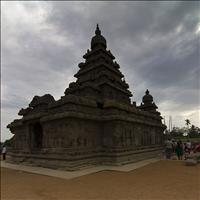 This is one of the oldest temples in South India. It belongs to the 8th Century AD and is a good example of the first phase of structural temples constructed in Dravidian style.\r\nThe Shore Temple occupies a most extraordinary site, by the very margin of the Bay of Bengal so that at high tide the waves sweep into it and the walls, with their sculptures, have been eroded by the winds and waves of thirteen centuries.
This is one of the oldest temples in South India. It belongs to the 8th Century AD and is a good example of the first phase of structural temples constructed in Dravidian style.\r\nThe Shore Temple occupies a most extraordinary site, by the very margin of the Bay of Bengal so that at high tide the waves sweep into it and the walls, with their sculptures, have been eroded by the winds and waves of thirteen centuries.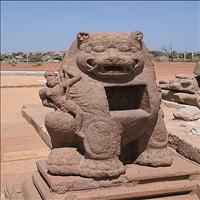 There are three shrines in the Shore Temple. That facing the sea and another facing west into the township is Saiva. The one between is Vaishnava, with an image of Lord Anantasayi made of live rock. There are Vimanas over the Saiva (also spelt as Shaiv or Shaiva) shrines, but none over the third; it seems to have disappeared with time. There are Somaskanda reliefs on the walls of the Saiva shrine. In front of the eastern shrine there is a stone dhvajastambha, frequently under the waves. The light that shone on it at night must have been the last sight of home for thousands of Pallava citizens immigrating to South East Asia.
There are three shrines in the Shore Temple. That facing the sea and another facing west into the township is Saiva. The one between is Vaishnava, with an image of Lord Anantasayi made of live rock. There are Vimanas over the Saiva (also spelt as Shaiv or Shaiva) shrines, but none over the third; it seems to have disappeared with time. There are Somaskanda reliefs on the walls of the Saiva shrine. In front of the eastern shrine there is a stone dhvajastambha, frequently under the waves. The light that shone on it at night must have been the last sight of home for thousands of Pallava citizens immigrating to South East Asia.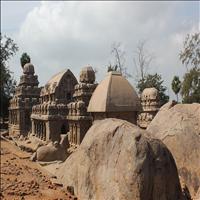 The Five Rathas - The Dharma raja, The Bhima, The Arjuna, The Draupadi and The Sahadeva\r\nThe Five Rathas, about 200 m south of the main hill, were fashioned out of a smaller hill sloping down from the south. From the largest part was made the biggest of the five rathas, the Dharmaraja. Then followed onwards north, in the descending order of height, the Bhima, the Arjuna and the Draupadi. A little to the west of Draupadi there was a comparatively large rock and out of it the Sahadeva Ratha was made. Immediately in front of the Draupadi again two smaller rocks were sculptured into an elephant and a lion. Behind the Draupadi and the Arjuna, which stand on a common base, there is a Nandi.
The Five Rathas - The Dharma raja, The Bhima, The Arjuna, The Draupadi and The Sahadeva\r\nThe Five Rathas, about 200 m south of the main hill, were fashioned out of a smaller hill sloping down from the south. From the largest part was made the biggest of the five rathas, the Dharmaraja. Then followed onwards north, in the descending order of height, the Bhima, the Arjuna and the Draupadi. A little to the west of Draupadi there was a comparatively large rock and out of it the Sahadeva Ratha was made. Immediately in front of the Draupadi again two smaller rocks were sculptured into an elephant and a lion. Behind the Draupadi and the Arjuna, which stand on a common base, there is a Nandi.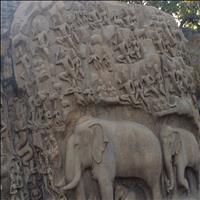 This wonderful open air bass relief, is the biggest in India. This magnificent relief carved out of one rock, is a seventh century marvel, and was created to celebrate the victory of the Pallava King, Narasimhavarman 1 over Chalukiya king.
This wonderful open air bass relief, is the biggest in India. This magnificent relief carved out of one rock, is a seventh century marvel, and was created to celebrate the victory of the Pallava King, Narasimhavarman 1 over Chalukiya king.
The sculptures carved in the natural fissure that divides the cliff not only depict a cosmic event of Ganges descending to earth (a popular narration and depiction in the iconography of Shiva) at the command of Shiva but also shows the event being watched by scores of gods, goddesses, mythical figurines of Kinnara, Gandharva, Apsara, Gana, Nagas, and also wild and domestic animals, all admiringly looking up at the scene. The total number of carvings are probably about 146.
The rock has two mythological stories attached to it. One is descent of the mighty Ganges on earth and the other is penance of Arjuna the warrior of Mahabahrata, who attains the Pashupati Astra from Lord Shiva.
Timings: Sunrise to Sunset
Remarks: A UNESCO World heritage cultural site.
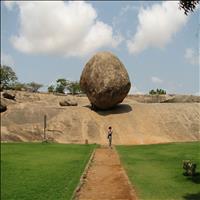 Krishna’s Butter ball, is a gigantic stone boulder, resting on a short incline in the historical town of Mammallapuram. The more than 200 ton weighing boulder, apparently is standing on the slope without moving even a millimeter for the last 1200 years, it is said.
Krishna’s Butter ball, is a gigantic stone boulder, resting on a short incline in the historical town of Mammallapuram. The more than 200 ton weighing boulder, apparently is standing on the slope without moving even a millimeter for the last 1200 years, it is said.
The original name to this is “Vaan Irai Kal” which in the local dialect, Tamil, means, Stone of the Sky God. The present name to this boulder was given a by a local guide when the then Prime Minister Mrs. Indira Gandhi visited the place.
The erstwhile rulers have always tried to move it with the help of Elephants and other manual instrument but to no avail. The stone has not moved. It is one of the rare objects in the world which defies gravity.
Timings: whole day
Dakshinchitra is an attempt to preserve some of the traditional south Indian ways of life by constructing a "living" village containing some of the various traditional homes of south India.Dhakshin chitra, open to public from December 1996, is a heritage village where the unique lifestyle of Indians is revived based on their states. The center occupies ten undulating acres overlooking the Bay of Bengal, at Muttukadu, twenty five kilometers south of Chennai, on the East Coast Road to Mamallapuram, Tamil Nadu, India. The following are the activities you can do at Dakshinachitra,1) Take a tour around DakshinaChitra visiting all the heritage homes exploring their nooks and corners and bask in the charm of a bygone era. 2) Try your hand at Simple Art and Craft Activities as you tour around. 3) Play traditional games too! Enjoy playing an array of board games, spin tops, break pots and even shake a leg... 4) Also take a peek at the exhibitions that explain some of the rich traditions of South India.
Closed On: Tuesday
Closed On: Tuesday
UNESCO World Heritage Sites of India / PC-637 (13 Days / 12 Nights)
Delhi-Agra-Jaipur-Mumbai-Aurangabad-Mumbai-Chennai-Mamallapuram-Chennai
“India is the cradle of the human race, the birthplace of human speech, the mother of history, the grandmother of legend, and the great grand mother of tradition. Our most valuable and most restrictive materials in the history of man are treasured up in India only!” The above words by the famous author Mark Twain, summarize the true definition of India. A country which is the birth place of 4 religions and has a legacy of in numerous rulers through the length and breadth its vast region, has many such monuments which mark the impact on its culture and tradition by various rulers and religious leaders. Not surprising hence, that India has about 30 sites already included in the UNESCO world heritage site lists and 30 more are in the pipeline. This itinerary takes you to the most renowned and famous world heritage sites of India approved by the UNESCO, which will give you the breath of Indian culture and tradition as it progressed over the centuries!!
Detailed Itinerary
Day 1 : Delhi
Day 2 : Delhi
Day 3 : Delhi
Day 4 : Delhi-Agra
Day 5 : Agra-Jaipur
Day 6 : Jaipur
Day 7 : Jaipur-Mumbai
Day 8 : Mumbai-Aurangabad
Day 9 : Aurangabad
Day 10 : Aurangabad-Mumbai
Day 11 : Mumbai-Chennai
Day 12 : Chennai-Mamallapuram-Chennai
Day 13 : Chennai
Delhi-Agra-Jaipur-Mumbai-Aurangabad-Mumbai-Chennai-Mamallapuram-Chennai
“India is the cradle of the human race, the birthplace of human speech, the mother of history, the grandmother of legend, and the great grand mother of tradition. Our most valuable and most restrictive materials in the history of man are treasured up in India only!” The above words by the famous author Mark Twain, summarize the true definition of India. A country which is the birth place of 4 religions and has a legacy of in numerous rulers through the length and breadth its vast region, has many such monuments which mark the impact on its culture and tradition by various rulers and religious leaders. Not surprising hence, that India has about 30 sites already included in the UNESCO world heritage site lists and 30 more are in the pipeline. This itinerary takes you to the most renowned and famous world heritage sites of India approved by the UNESCO, which will give you the breath of Indian culture and tradition as it progressed over the centuries!!
Detailed Itinerary
Day 1 : Delhi
Day 2 : Delhi
Day 3 : Delhi
Day 4 : Delhi-Agra
Day 5 : Agra-Jaipur
Day 6 : Jaipur
Day 7 : Jaipur-Mumbai
Day 8 : Mumbai-Aurangabad
Day 9 : Aurangabad
Day 10 : Aurangabad-Mumbai
Day 11 : Mumbai-Chennai
Day 12 : Chennai-Mamallapuram-Chennai
Day 13 : Chennai
Temple Tour of Tamil Nadu / PI-0107 (7 Days / 6 Nights)
Chennai-Mamallapuram-Kanchipuram-Mamallapuram-Puducherry-Thanjavur-Tiruchirappalli-Madurai-Chennai
Tamil Nadu is one of the southern states in India. Tamil Nadu is famous for its innumerous temples and beaches, along with its delicious cuisine. This tour starts from the capital city of the state, Chennai, to take you around the places of main pilgrimage centres of the south.Unfortunately many temples here do not allow non-hindus to enter the sanctorium. But to watch the architecture of the temples from outside itself is a breath taking experience. Come and enjoy this five day tour and get entjralled with the mytholocgial stories related to the temples and the beautiful architecture along with an insight to the dravidian culture.
Detailed Itinerary
Day 1 : Chennai
Day 2 : Chennai - Mamallapuram
Day 3 : Mamallapuram - Kanchipuram - Mamallapuram
Day 4 : Mamallapuram - Puducherry -Thanjavur
Day 5 : Thanjavur-Tiruchirappalli-Madurai
Day 6 : Madurai
Day 7 : Madurai-Chennai
Chennai-Mamallapuram-Kanchipuram-Mamallapuram-Puducherry-Thanjavur-Tiruchirappalli-Madurai-Chennai
Tamil Nadu is one of the southern states in India. Tamil Nadu is famous for its innumerous temples and beaches, along with its delicious cuisine. This tour starts from the capital city of the state, Chennai, to take you around the places of main pilgrimage centres of the south.Unfortunately many temples here do not allow non-hindus to enter the sanctorium. But to watch the architecture of the temples from outside itself is a breath taking experience. Come and enjoy this five day tour and get entjralled with the mytholocgial stories related to the temples and the beautiful architecture along with an insight to the dravidian culture.
Detailed Itinerary
Day 1 : Chennai
Day 2 : Chennai - Mamallapuram
Day 3 : Mamallapuram - Kanchipuram - Mamallapuram
Day 4 : Mamallapuram - Puducherry -Thanjavur
Day 5 : Thanjavur-Tiruchirappalli-Madurai
Day 6 : Madurai
Day 7 : Madurai-Chennai
Dravidian Heritage / PC-644 (15 Days / 14 Nights)
Chennai-Covelong-Kanchipuram-Mamallapuram-Covelong-Puducherry-Chidambaram-Swamimalai-Thanjavur-Tiruchirappalli-Madurai-Thekkady-Kochi-Guruvayur-Kozhikode-Mysore-Chikmaglur-Shravanabelagola-Bengaluru
South India, stretching south of the Vindhya Mountain ranges down to the coastal areas surrounded by the Bay of Bengal and the Arabian Sea, covers a vast swathe of the Deccan plateau. The states in this region are Kerala, Tamil Nadu, Andhra Pradesh and Karnataka, all four of which have their own languages, slightly differing from each other, but vastly different from the language and culture of the Indian heartland in the North and West. South India has two major claims to being a tourist attraction. Thousands of miles of pristine coastline and sandy beaches, dotted with sea side resorts and the ancient Hindu heritage architecture, temples and remnants of the Indus valley civilization. Boat trips on the backwater canals and protected wetlands, not to mention the health spas and Ayurveda clinics, make for a rejuvenating vacation, and most tourists leave Kerala in much better shape, mentally and physically, than when they came in.
Detailed Itinerary
Day 1 : Chennai-Covelong
Day 2 : Covelong-Kanchipuram-Mamallapuram-Covelong
Day 3 : Covelong-Puducherry
Day 4 : Puducherry-Chidambaram-Swamimalai
Day 5 : Swamimalai-Thanjavur-Tiruchirappalli-Madurai
Day 6 : Madurai
Day 7 : Madurai-Thekkady
Day 8 : Thekkady-Kochi
Day 9 : Kochi
Day 10 : Kochi-Guruvayur-Kozhikode
Day 11 : Kozhikode-Mysore
Day 12 : Mysore
Day 13 : Mysore-Chikmaglur
Day 14 : Chikmaglur-Shravanabelagola-Bengaluru
Day 15 : Bengaluru
Chennai-Covelong-Kanchipuram-Mamallapuram-Covelong-Puducherry-Chidambaram-Swamimalai-Thanjavur-Tiruchirappalli-Madurai-Thekkady-Kochi-Guruvayur-Kozhikode-Mysore-Chikmaglur-Shravanabelagola-Bengaluru
South India, stretching south of the Vindhya Mountain ranges down to the coastal areas surrounded by the Bay of Bengal and the Arabian Sea, covers a vast swathe of the Deccan plateau. The states in this region are Kerala, Tamil Nadu, Andhra Pradesh and Karnataka, all four of which have their own languages, slightly differing from each other, but vastly different from the language and culture of the Indian heartland in the North and West. South India has two major claims to being a tourist attraction. Thousands of miles of pristine coastline and sandy beaches, dotted with sea side resorts and the ancient Hindu heritage architecture, temples and remnants of the Indus valley civilization. Boat trips on the backwater canals and protected wetlands, not to mention the health spas and Ayurveda clinics, make for a rejuvenating vacation, and most tourists leave Kerala in much better shape, mentally and physically, than when they came in.
Detailed Itinerary
Day 1 : Chennai-Covelong
Day 2 : Covelong-Kanchipuram-Mamallapuram-Covelong
Day 3 : Covelong-Puducherry
Day 4 : Puducherry-Chidambaram-Swamimalai
Day 5 : Swamimalai-Thanjavur-Tiruchirappalli-Madurai
Day 6 : Madurai
Day 7 : Madurai-Thekkady
Day 8 : Thekkady-Kochi
Day 9 : Kochi
Day 10 : Kochi-Guruvayur-Kozhikode
Day 11 : Kozhikode-Mysore
Day 12 : Mysore
Day 13 : Mysore-Chikmaglur
Day 14 : Chikmaglur-Shravanabelagola-Bengaluru
Day 15 : Bengaluru
Mamallapuram, India Tours

